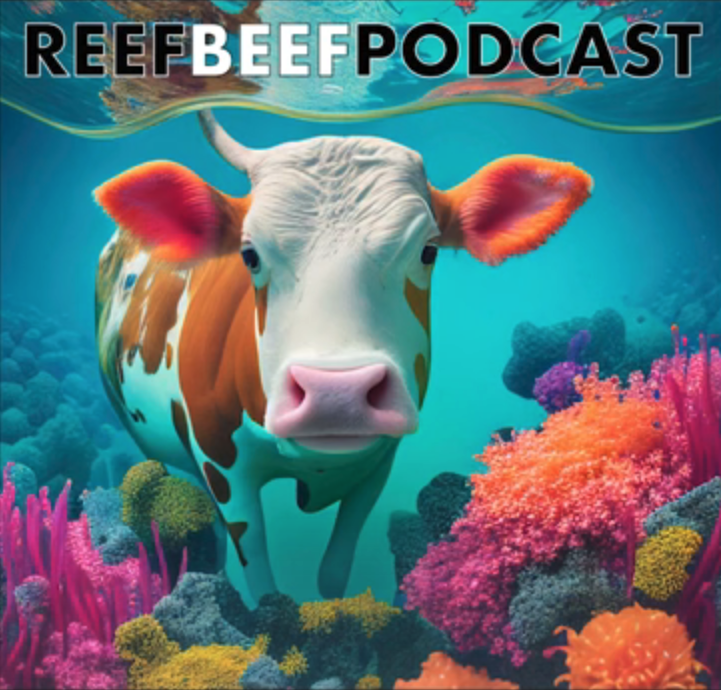A Conversation Between Nathan Hill and Rich Ross
From Reefs Magazine
For American readers unfamiliar with Nathan Hill, he might considered my analogue in the UK – he is a regular contributor to Practical Fishkeeping where he often tackles hobby issues from the stance of ethical, critical, and consistent thinking, while trying to get the hobby to look at itself in the mirror – he also has a degree in philosophy, which makes him super cool in my book. Nathan and I have been aware of each other for several years, briefly communicating from time to time with notes like, “Great piece, but I think I have a few disagreements – let’s talk,” but we have never found the time to be able to really dig in… until now. I have wanted to revisit morals in the Skeptical Reefkeeping series for some time now, and convinced Nathan to participate in a written discussion with me on a topic of his choosing, which turned out to be, “Is the hobby morally justifiable?” We wrote back and forth to each other in email, and then assembled the discussion below, doing some editing to make things more clear. It is important to point out that this is a conversation, not a debate. The point of a debate is to win, the point of a conversation is to hear each side and shift ones views based on good information presented from a perspective one may not have entertained previously. The point is for all of us to learn and grow together, not to try to ”win.” We hope you enjoy this philosophical conversation, and look forward to any feedback you might have (please post any feedback in this shiny new discussion forum:https://www.reefs.com/forum/skeptical-reefkeeping/ )
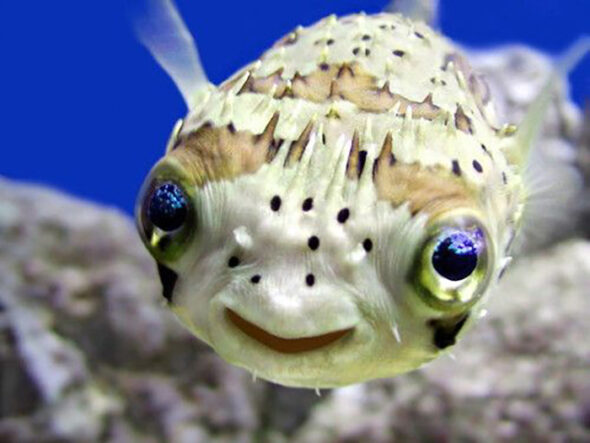
A Brief Reminder to Set the Scene
Skepticism is a method, not a position. It can be defined as a method of intellectual caution and suspended judgment. As a Skeptical Reefkeeper, you decide what is best for you, your animals, and your wallet, based upon critical thinking, not just because you heard someone else say it. The goal of this series of articles is not to provide you with reef recipes or to tell you which ideas are flat out wrong or which products really do what they say they do or which claims are trustable or which expert to believe. The goal is to help you make those kinds of determinations for yourself, while developing your saltwater expertise in the face of sometimes overwhelming or conflicting advice.
Is the Hobby Morally Justifiable?
Let’s get this party started.
Nathan Hill:
Is this hobby morally justifiable? Is it intrinsically good for, bad for, or indifferent to the interests of the fish involved? Will future enlightened generations look back on us phlegmatically, or with vitriol? Will they consider us good?
I think a case might be made for a good hobby, if I consider its de-facto purpose. But there are hurdles. The greatest is a recent mode of thinking, devised and ossified into some European culture that runs as follows: “All animals – fish included – have one inherent right, and that is the right to not be the property of humans.“ This is a somewhat concrete obstruction to anyone taking the life of another animal in to their care – if it is both valid and sound. To me, at least, it seems an argument as well rounded as a snooker ball. I even asked the founder of modern animal rights, Peter Singer, what he thought of the hobby and he responded that: “…it is always possible to imagine circumstances in which one could keep sentient beings captive – essentially, where it is for their own good, and where efforts are made to give them the best kind of life that the available resources permit. If… humans get enjoyment from looking at them, and this does not harm them, that’s an addition.”
Singer alludes to a good hobby, as I do, though the caveats are apparent.
I’m keen to avoid a tit-for-tat style of conversation. If we just resort to trying to trump each other with specific incidences of good or bad, then we’re in PETA territory. Let’s look at the hobby as an individual entity beyond the sum of its parts. What is the purpose of fishkeeping, and is that purpose morally well intentioned? Do I have a right to do it?”
Rich Ross:
I think the hobby is good, bad, and indifferent to the interests of the fish involved. The hobby is good for generating interest in aquatic habitats that might otherwise be ignored by the general public and good for overall understanding in general, which is good for all fishes. It can be bad for particular fish like the fish that are poorly cared for, or shipped badly, or that go to hobbyists that fail to take care of them properly. Perhaps both of those two add up to a sum of indifferent.
I have no idea how to assess the moral status of fishkeeping. On the one hand, there are so many other uses of animals (food, development, labor, etc.) that it seems very difficult to make a true assessment. To complicate this further, it is hard to make a moral assessment of any hobby – is recreational fishing moral? Is riding motorcycles though the country side moral? Is air travel to far off destinations moral? Every activity has negative effects on the world, so doing anything is a moral trade off.
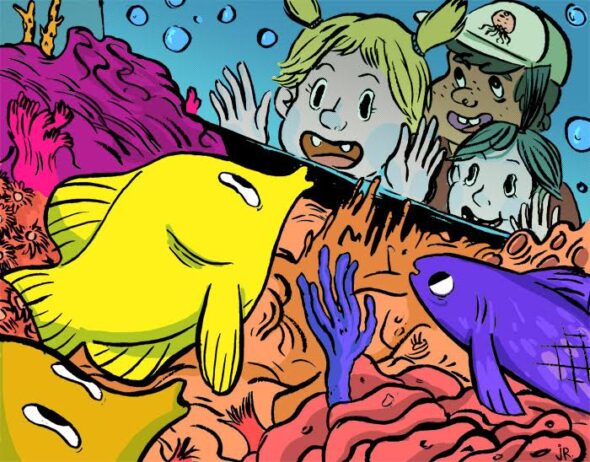
The inherent rights question is interesting. Society in general doesn’t seem to agree with the statement that animals have the right to not be the property of humans. Nature itself seems to disagree with the statement, as meat is often a natural part of the human diet. To the Singer quote (and I love me some Singer), the “does them no harm” seems to be the major sticking point; harm to the individual or to the group as a whole through the chain of custody? I might look at it from the other direction: “Is it a right of humans to have animals in an aquarium?” as is sometimes asserted by people who want to keep animals.
Nathan Hill:
Assuming that the hobby itself is amoral, and only the actions of those engaging in it constitute the values, are we not lapsing back in to the war of attrition I alluded to earlier? This seems to lack something fundamental, if all we can do is weigh the merits of one action against the detriment of another, to see whether the overall aggregate is a gain or a loss. I think that a moral basis for this hobby exists, but requires teasing out.
Regarding the point of nature over rights, I see no reason to regard an amoral entity (i.e. the wilderness) as a guide for moral acts. The idea that nature is good invites the corollary position that unnatural = bad, instantly placing the unnatural act of retaining livestock in aquaria in a negative position. Nature used this way can justify incredible cruelty. If a pet owner deliberately infects a dog with parasites and watches it die in agony, then surely his defense is as simple as,“dogs get parasites naturally.“ But I’ll wager that neither of us will dispute that this is a bad thing. I’ll even bite the bullet here, and say on this line of reasoning, recreational fishing might be classed as immoral.
Rich Ross:
I don’t think I was weighing actions against each other, more sorting out the universe of discourse. All too often in the hobby the justifications are something like, ”I breed fish, so fishkeeping is morally justified, morally good,” which ignores all the other aspects of the hobby that are/may be problematic. Looking at moral justification for specific parts of the hobby seems easy, looking at it as a whole seems harder, and I am not sure how to morally justify, “it’s pretty and I like it in my living room, so the ends justify the means.” It’s a fine justification, but I’m not sure it has any appreciable moral standing. More fundamentally, there is a moral justification for anything, but that doesn’t mean it is good justification. Animal testing on cosmetics seems like an odd thing to justify, and may be a good parallel to the hobby, as cosmetics seems to ultimately share the same justification the hobby does: “It’s pretty and I like it, so the ends justify the means.”
Recreational fishing is a favorite example of mine that I like to bring up when the Hawaiian Aquarium collecting legalization comes up. Collecting live fish for the aquarium trade is portrayed as bad, while recreational fishing that kills animals is, if not portrayed as good, simply accepted as something not to be questioned. To be logically consistent, if taking animals off the reef for home aquaria is bad, then it seems that taking them off the reef for sport is also bad. It isn’t that sport is intrinsically good and aquariums are bad, it is that sport is a widely accepted activity (and it brings a ton of money into the local Hawaiian economy).
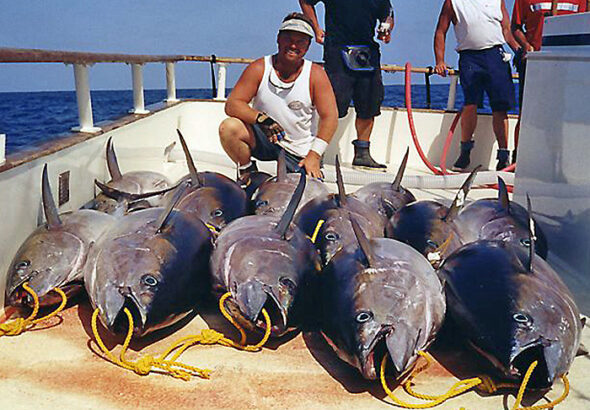
I’m trying to avoid a larger moral discussion, but perhaps it needs to be mentioned that I don’t think there are any objective morals. Morals change over time and are set by society which may mean I am confused about the ”something fundamental” you mention. If you think that a moral basis for this hobby exists, lets get to it.
Nathan Hill:
I’ll take the last point first, and I’ll take it as I think I’ve unearthed the first fundamental difference between the American and the English mindset (very, very broadly speaking, that is). I’ll firstly agree that accepted (or acted-upon) morality is progressive and shifting within societies, but in the UK we are ebbing towards a “standard candle” of ethics regarding animals, and that candle is the emphasis on pain perception and sentience. To wit – causing pain is bad, increasing happiness is good – a variation on the classic utilitarian stance. This is what I mean about something fundamental and inextricable from the hobby. Is the hobby itself promoting good in the sense of reducing pain and/or increasing happiness for all involved? I’m more than happy to cite references to support the pain theory in fish, I should add.
That leads me to the point on the recreational fishing/aquarium trade equivalence. This is where I think there’s actually a paradox (which you loosely allude to). Following from my pain bad/happiness good approach, fishing should be held to moral scrutiny, and aquarium keepers…? Well, this is the point I’m trying to establish. I think that aquarium keepers, in being a part of the hobby, are trying to keep fish happy, but I might be wrong on this. That, I think, is what I am interested in exploring – whether the hobby itself is purposefully geared towards happiness. Because if it is geared around some other factor (such as the more pragmatic talk of money you hint at) then might it not be morally wrong, yet defensible on (and only on) a human level of happiness?
Ending with your first point, I’m in a position now to not have to draw a parallel on animal testing for cosmetics, as I can assert with reasonable confidence that it fails the “increased happiness” element of my proposed moral basis. With all of this is mind, what can we say of the hobby?
Rich Ross:
This is good; now I know better where you are coming from. If we accept the stance that causing pain to fish is bad (we can ignore coral for now), then I don’t see how recreational fishing or aquarium keeping can be considered moral. It is important to note that I am not sure that I agree with this stance.
Of course we need to define pain and determine if the brain power of the fish involved means that pain is significant to a conscious creature – in other words, sure a fish experiences pain, but does that pain matter in the same way it matters to a human? Given the idea that causing pain is bad, the reasons why recreational fishing should be abandoned are obvious – hooks in the mouth, grabbing with gloved hands, ripping hooks from lips, heads cut off while alive, tossed on the deck to gasp for air until death, etc. – all seem like incredibly inhumane things to do to an animal that feels pain.
In aquarium keeping, we would have to be quite dedicated in considering all aspects of the chain of custody, and not simply look at a good hobbyist with a good set up. There currently seems to be no hard data, but there is some amount of death in the chain of custody, and that is clearly bad – even without the context of the current discussion, more should be done to ensure that there is less death in the chain of custody (it may not be possible to get to 0% mortality in the chain of custody, but constantly striving for that percentage seems like the moral thing to do). So, how much “pain causing” to animals in transit is acceptable? A difficult question from any perspective. More worrisome to me is the thought that unskilled hobbyists outnumber skilled hobbyists. Unskilled hobbyists, almost by definition, kill animals. This seems to be a natural part of the learning curve. Biological cycles gone wrong from rushing or improper set ups, over feeding, equipment malfunction, inappropriate species housed together, too many animals too soon, etc., are all ways that aquarium animals are routinely “caused pain.”
I am not sure that intent matters here. Does it matter if new, inexperienced hobbyists are “trying to keep fish happy” don’t due to lack of experience or being steered toward poor practices by merchants which causes animals to suffer, and die? The dedicated hobbyists seem to be interested in keeping their fish happy, but even they fail from time to time and animals die. If we are accepting that the idea that causing fish pain is bad, I am not sure that that intent can override the moral justification for the hobby. Again, how much good intent can override the idea that actually causing pain to animals is bad? <
It appears that your “standard candle” of the UK being different from the US based on ethics regarding animals seems not that compelling, given that the UK allows recreational fishing and hunting and factory farming. If the UK is going to start legislating aquarium fish based on the idea that causing pain to animals is bad, this seems to simply be a case of going after the low hanging fruit rather than actually addressing the broader issue of animal welfare.
I don’t know if I can accept the “pain is bad” idea as discussed so far. Since morals vary over time, and since other forms of causing pain to animals are acceptable in both the US and the UK, I am not sure we can hold aquarium keeping to a different standard. Well, we can, but I don’t know if that is a consistent stance that I would feel good about holding. Surely there is much we can do to reduce the amount of pain and suffering to animals in the aquarium hobby, and I think that should be done, but I don’t know if we can possibly justify or demonize the hobby based on the idea that animals feel pain.
Nathan Hill:
Though I say that causing pain is bad as a moral premise, my implication is not that fishkeeping as a hobby is geared in such a way to intentionally promote pain. You rightly highlight that degree of perception should considered when making relative statements. I do not dispute this, and will make no further comment here on recreational fishing, for reasons I’ll come to.
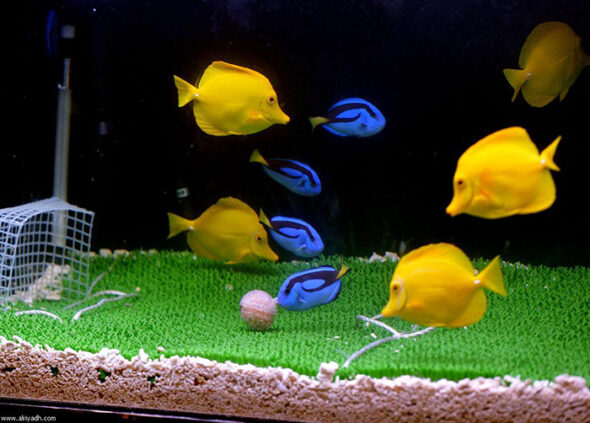
You mention the chain of custody, and of the cut-off point for an acceptable degree of suffering during capture and transportation, and the hobbyist learning curve. I consider these points as contingent to the hobby – fishkeeping in aquaria is not predicated on the suffering, nor do I think it necessarily relies upon it. Is suffering of livestock an inevitable consequence of fishkeeping? And would it influence a hobbyist if he or she knew the extent of potential suffering? Regardless, I don’t believe the intention is to cause mortality and distress at any stage of the supply chain, and wager that aquarists, given transparency about such a scenario, would boycott fish moved this way. This, of course, plays in to your point about balancing pain-and-gain, but I’m willing to concede it, as I hold that it’s still only a contingency; nothing written so far is implied as the intention of the hobbyist. It happens, yes, but it is not the desired outcome.
This leads me to where I think we may be opposed. I’m unashamedly sticking with “intent.” You ask if it matters if new aquarists are intentionally good even when they kill things. I say yes, yes they are. If they could have avoided those deaths, then they would have.
For me this is the very point to be resolved. If intent is key, as I believe it is, then I claim a case can be made in defense of a morally good hobby. If, however, it could be shown that the intent was to cause the problems you allude to, then we’re fighting very different battles. My approach is teleological, from the top-down: I see the ideals we have and then wish to explore if they’re attainable. I think they are.
Forgive me if I misrepresent you, but you appear to be moving from what I’d call the ontological: You see the realities of the industry and hobby from the bottom up, and explore where they inevitably lead. If I’m correct here, then your measure of the hobby is to see if the gain is equal to, or greater than, the sum of its parts. My worry with this approach is that it is liable to lead to a “minimum standard” of care, at which point anything above might be considered ”good”, and anything below it ”bad”. I think the stance ignores the fish as an entity deserving of consideration in its own right, rather, it becomes a numbers game.
Regarding my standard candle point, I’d argue that as we (UK) become more aware of pain and suffering as a population, so the trickle down is that there is a continuous, newly forged revulsion toward formerly accepted policies. To be recidivist on my (much) earlier policy of not tit-for-tatting, certain practices such as fox hunting have been banned, along with various intensive farming methods. There have even been high profile prosecutions of people who have ingested live goldfish, with the suffering being a decisive point when the cases came to court. My contention is that aside from some poorly handled ‘rights’ groups in America, the top-down influence there seems (to my anecdotal experience) to be less, though this is to stereotype a nation on my part.
Emphasizing on utilitarian ideals (in one form or another), I think using “pain is bad” as a basis of morality is an excellent starting point. Here we will argue. That suffering happens elsewhere, and may or may not be accepted, is only to say that the moral standard in those other cases is presently too low and needs addressing. Pain can only be justified in cases of necessity over luxury. If a Danio needs to be subject to painful testing to cure an agonizing illness in a dozen people, then that balance is unfortunate but necessary. If a Danio needs to die painfully to give someone a cheap thrill, then this is not necessary.
I will agree that it might seem disproportionate to focus on fishkeeping over the myriad other pressing woes, but I’d still say that all cases of suffering, where they can be addressed, should be addressed. To say we shouldn’t feel bad about something because worse events are happening elsewhere is as inconsistent as me saying to you that you should stop having fun, because somewhere a millionaire playboy is having an even better time than you. Low hanging fruit is still fruit, and sometimes good practice before picking the trickier crop.
I claim that pain should be a very real basis for deciding whether the hobby is good or bad. Currently, I declare that it is good, and inherently so.
Rich Ross:
The easy part first. I absolutely agree that low hanging fruit is still fruit and is good to pick. I bring up the other trickier ideas not to discount the low hanging fruit, but rather to put the low hanging fruit in context.
I don’t know how much of any of the discussion I actually hold to – I am more of a practical philosopher (which got me in a lot of trouble in college) and I am often more interested in the reality of a situation rather than what could be. For instance, I am not sure how much it matters if the intent is not to cause pain if the practice in reality is causing pain. I agree that the hobby is not predicated on suffering, but the reality seems to be that there is at least some suffering; there is at least some pain being caused to animals.
I don’t think it can necessarily be said that the general intent of hobbyists is good, because there are a decent percentage of hobbyists that really just want pretty animals in their tanks. The tanks are decorations, not boxes of intended goodness . Of course it could be argued that the intent is good because if it wasn’t, the decoration would be sub par, but there still seems to be a good amount of the cut flower mentality – if the animals die, get new ones, or just replace the aquarium with wall art – just follow up the installs from TV show TANKED.
I don’t think the hobby necessarily relies on causing pain and suffering, but I do worry that the general practice of the hobby/industry/trade allows/accepts/ignores at least some suffering because it is ultimately financially expedient to do so. Cost is more often than not the deciding factor in animal welfare, not the ethical treatment of the animal. This applies to any business/hobby that deals in live animals or animal products.

I think there could be a morally justified hobby, I am just not sure if the hobby as it is today can be considered morally justified. Perhaps, perhaps not. Sometimes it seems to be moving that way, but not always and not consistently. Since I was first involved in wild collection, I have often been on the cusp of leaving the hobby based on discussions with myself that mirror the one we are having now. Generally, I lean on the side of the work I am doing as being better for all involved, including the animals, and the hobby in general. So I stay involved.
I think that pain, as a real basis for deciding whether the hobby is good or bad, might be a great way to make that determination, however, I keep getting caught up on the reality of the hobby as it seems to currently stand – we know there is room, perhaps a lot of room, for improvement.
Nathan Hill:
I’ll need to concede the point that a lot of hobbyists are only keeping aquaria for aesthetic reasons. As you state, there are tanks as decorations, and I’d probably have to even accept that these outnumber all other uses of aquaria – biotopes, public, research, etc. – combined. This is a troubling point, and could weaken my hand.
I want to avoid making a “no true Scotsman” type of argument here, so I’m obliged to revise my position; I don’t want to try to argue that only a “real” fishkeeper is interested in enhancing happiness, and that everyone else is a fraudulent hobbyist. I’ll agree that financial expediency is currently king over ethical imperative, though I can see that this is shifting in the case of the UK model at least.
In fact, there are no points you raise that I want to contest beyond the conclusion. I agree that the current system is peppered with suffering and death, and I, too, have been on the cusp of leaving in abject disgust.
I think there could be a morally justified hobby, if the trade started working towards it.
I think that a lot of keepers of aquaria as decorations are currently ignorant to the problems inherent in the current system. If they were aware of certain practices, and certainly of death rates, then I have confidence that a sizeable number would either eschew and abandon the hobby, or look for ethically sound alternatives for supply (price point pending). In this way, I think that the hobby can organically evolve as a good entity, instead of one currently hiding its activities from its own participants in a fog of shame.
But my distinction is between the trade and the hobby. I consider the two separate, yet inextricably intertwined; the former a by-product of the latter. I think much of the hobby unknowingly supports the nefarious aspects of the trade infrastructure, and I think that that the ignorance of the hobbyist is often the industry’s strength. A lot needs to be reformed on an industry-wide level, though the hobbyists need to be aware of this before it’ll happen. I don’t honestly think that many hobbyists would be happy to purchase one fish knowing that another number had to necessarily die to facilitate it. I trust I don’t need to spell out the dilemma here of how reform can’t come about without the trade having its worst aspects aired in public, which is of course entirely against its own interests.
I think I might be better placed to liken the hobby to a Golem. It can be a force in either direction – for moral goodness or moral indiscretion – and currently it lacks the information it needs to be good. I suspect that it might benefit from knowing the realities behind the shop fascias and supply lines that bring fish in. On this basis, I still maintain that the direction of the hobby can be morally good, even if the current activities are questionable.
Throughout this dialogue, we’ve both rallied towards the enhancement of fish welfare, and the reduction of pain and suffering. The question I think we might want to close on is how the current system might be fixed. In the above, I allude to transparency, but I fear that I’m only asking the Turkeys to vote for Christmas (or Thanksgiving, for the US equivalent).
Rich Ross:
There is much that you just wrote that I am in complete agreement about, and hope that if hobbyists were aware of bad handling practices, that they would seek out vendors that partake in good handling practices. I worry though – there have been several attempts in the US of vendors specializing in truly sustainable and responsible livestock…and all have gone under, seemingly due to not being able to compete in both selection and price. Of course, these may not be the only reasons such vendors have not yet succeeded, but the worry is there.

I actually go one step further on your distinction between Trade and Hobby – I see three major arms of the machine that deals in live fish and corals as pets. Hobby, Trade, and Industry. The Hobby consists of the hobbyists, those keeping animals in their homes for various reasons.
The Trade are those that collect, supply, import and export the animal life the Hobby thrives on. The Industry consists of those that manufacture equipment and goods, as well as those that sell directly to the Hobbyists.
I think it is important to make these distinctions because all too often when people talk of reform, that talk is generalized to the point that everyone thinks it is someone else’s responsibility to make the reform. I generally think wanting hobbyists to drive reform has the ladder upside down.
Sure, buying power can be a force for change, but with the lack of data and transparency in the chain of custody, asking hobbyists to choose only to buy ”morally acceptable” animals seems like a virtual impossibility. All hobbyists would have to join forces to drive change and that seems like an unfair and insane responsibility to put on people that are trying to enjoy a hobby – something people do in their spare time for fun.
I feel that the entities that are in the business for profit, the trade and industry, should be the ones making sure that the way they make a living is sustainable and responsible. They have the drive, money, and reason to create change, to get the word out, to educate the hobbyists and stores, and to create a third party certification scheme to make sure that their businesses will be in business in the future.
I agree the hobby is like a golem, and could be pushed into a direction that would make it morally justified or more morally justified. I think to make that happen, the three branches I described above, Hobby, Trade, and Industry, should each create an organization that helps guide and speak for them, helps disseminate information and acts as a clearing house and a central depository for direction and information. Then, all three of these organizations work together to fund and work for reform together (perhaps creating an independent third party certification scheme) so we can all quickly and efficiently move in the same direction of creating an responsible, sustainable, and morally justifiable hobby.
I’ll leave the last word to you, because you are English.
Nathan Hill:
One morose point I’m obliged to agree on is that of the hobby not favouring the responsible trader. Traditionally, those behaving with the interests of fish and environment over cold, hard profit have almost always dissipated to nothing. There may be other reasons for their demise, yes, but to say that the increased prices required of such a venture didn’t feature would be capitulating to doubt just a shade too much.
Personally, I think that leverage should radiate from the hobby to the trade and (to honour your distinction) the industry. My suspicion is that in a profit driven society, the profiteering entities have little imperative to try to shape the moral behaviour of the trade. Their role, I believe, has increasingly become one of acquiescing to the desires of the spender. I’ll grant that innovations can steer where the hobby may lead, but those innovations, too, will be founded on principles of cost effectiveness and profitability. Henry Ford would be proud.
No, I think that if it comes to the crunch, it is the hobbyists as a collective entity that decide the direction of the trade and industry, based on where they choose to spend their money. Every pound or dollar is a disguised vote for one principle or another, and the capitalist system is itself profoundly democratic in this way. The catch, of course, is convincing the lay fishkeeper that welfare (suffering reduction/happiness increase), habitat conservation and sustainability are more important than shopping for personal benefit. The idea of an individual spending more money for no tangible personal gain seems disingenuous at best, and asking people to forfeit financial savings so that they might share in some poorly defined moral integrity may be the biggest challenge the collective of fishkeeping will ever face. To me it seems obvious that increasing happiness is a virtue, but I need to also accept that this view is far from universal. As much as I might want it to be a founding principle for morality, it is, realistically, still wishful thinking on my part.
To your last point, I remain contrarian to the end and disagree wholeheartedly. I do not trust any organization that derives its profits from livestock to decide with impartiality on the best way of handling that livestock. Regarding an organization to coordinate trade, hobby and industry, I see the only viable option to be a benign but financially disconnected regulatory body, weighing up evidence on all matters within the fishkeeping sphere in an unbiased and arbitrary manner. I think that all information regarding the trade should be transparent, and information freely available to the hobbyist.
As I see it, I would rather that decisions regarding ethical behaviour were made by an entity who is morally naive to the subject of fishkeeping, and all legislation formed by this entity should be based on data and reasoning. Lobbying on the part of those who draw their wage from the subject should be disregarded, or we will never be free of the taint of greed at some level.
To summarize my opening query as I now see it: Is the hobby morally good?
In practice, no. The balance of suffering is too great, and from the fishes’ perspectives is unjustified.
As a concept, probably not. I hoped that the underlying intention of fishkeeping was to keep livestock happy, but your counterpoint to this – that many people just want to keep animals as decoration, while the animal’s needs are contingent – is a persuasive one. There’s no moral imperative for the hobby to keep fish happier in tanks than they would be in the wild. <
As an ideal or goal, maybe. With the “right” direction, and with an adequate framework to validate the happiness of fish over a plethora of mitigating circumstances, the aspirations of the hobby might be morally good. But this is entirely hypothetical, and subject to too many variables to be promoted as a good representation of the fishkeeping hobby. That I want people to consider pain and suffering as a basis of ethics is inadequate as a moral foundation, it seems.
I leave the closing passages to you, but from my UK stance, I fear for the status quo, and I fear for the future (as a hobbyist). Most of all, I fear for the unbiased arbitrators I mention above, as my suspicion is that they will be even less sympathetic to the trade, hobby and industry than either of us have been.
So There It Is
It seems that ”Is the hobby morally justifiable?” is a question that Nathan and I unite both agree is a resounding “Maybe.” Even though that is the case, it is clear that both Nathan and I have hope for the hobby, and think that if we can continue to make improvements, we can all partake in a hobby that we can be proud of.
*Special thanks to Jim Welsh for his spectacular proof reading services. *See more of J.R. Zuckerberg’s illustrations here!
